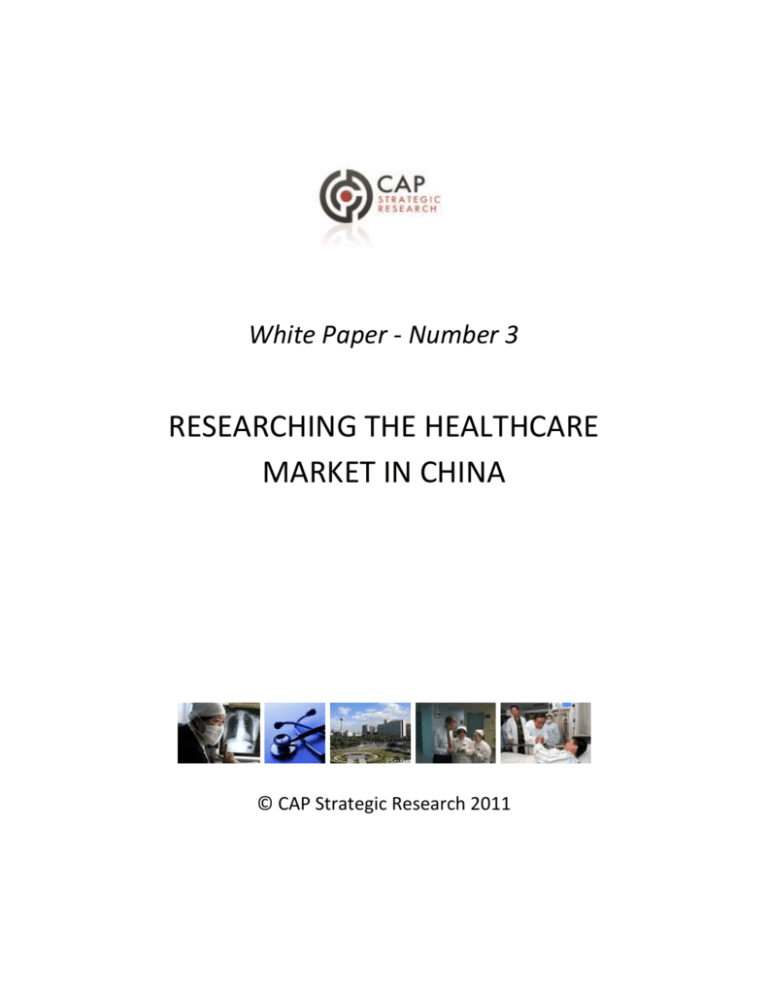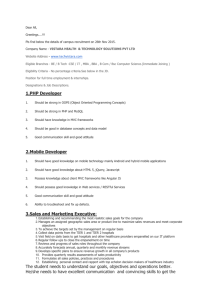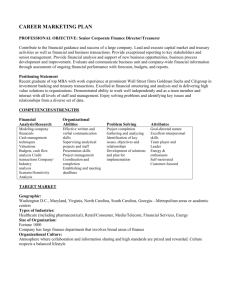Conducting Healthcare Research in China
advertisement

White Paper - Number 3 RESEARCHING THE HEALTHCARE MARKET IN CHINA © CAP Strategic Research 2011 CAP Strategic Research White Paper - Number 3 RESEARCHING THE HEALTHCARE MARKET IN CHINA 1. Introduction – Healthcare in China The Healthcare industry in China is huge, and this has major implications on the conducting of market research in that vast country. China has the most hospitals (60,784) and the most doctors (1.97 million) of any country in the world. In China there are now 17 doctors per 10,000 people compared to 25 per 10,000 people in the United States. Put another way there are 730 people per doctor, compared to 32,650 in Ethiopia, 611 in the United States and 210 in Italy. About 4.5 percent of the Chinese gross domestic product (GDP) is allocated to healthcare. By comparison the average healthcare expenditure of countries in the European Union is 9 percent of GDP, while in the United States it is nearer to 16 percent. Healthcare in China can range from a tooth pulled by sidewalk dentist at a local market to a sophisticated transplant operation performed at a major city hospital. Tradition Chinese medicine sits alongside Western medical practice. General Practitioners (GPs) do not exist in China in the same way as in other countries. Clinics and Hospitals are where doctors are located, both generalists and specialists. China’s healthcare industry is entering into a new era with advance development of the infrastructure system. The industry is blessed with several advantages - a very large population, an increasingly aged population, increasing prevalence of lifestyle disease and many more. The government has also boosted the industry growth with a US$ 120 Billion reform package - the government has committed heavily in the construction of thousands of hospitals, healthcare centres, clinics. Backed by these all factors, healthcare sector in China is expected to outperform all other sectors in the country in terms of growth. Major changes are also occurring in rural healthcare infrastructure. An interesting development is that anticipated rapid growth in this market is persuading many private sector giants to consider investing in the Chinese Healthcare industry. 2. Conducting Market Research in the Healthcare Industry in China 2.1 Market Researching Among Doctors GPs as such don’t exist in China. People who are sick visit a local clinic where they can seen firstly by a generalist doctor and then subsequently if required a specialist doctor. Generalists are mainly focused on community health care and disease diagnosis, including educational role for community citizens The chart below shows the incidence of both types of doctors by type of Government owned hospital. Private hospitals such as clinics in tier II and below cities, would employ generalists only. 2 CAP Strategic Research Government Owned Hospital Tier III Hospitals Tier II Hospitals Specialist Only Specialist (Majority) and Generalists (Few) Tier I or community hospitals Generalists Doctors are good respondents in China, more prepared to be interviewed, expect lower levels of incentives and are good at providing information. Local fieldwork agencies have lists of doctors and recruitment is mainly by phone. Online interviewing exists, but is difficult (unless it's a public health survey). Physicians in China don’t like to give too much information in a web survey. Incentives are almost always in the form of cash. The following gives an idea of cash incentives required. Depth and FGD Interview: Tier III hospital physicians US$ 77 - US$ 123 Tier II hospital physicians US$ 46 - US$ 77 Tier I hospital physicians US$ 31 - US$ 46 QT Interview: Tier III hospital physicians US$ 46 - US$ 77 Tier II &I hospital physicians US$ 31 - US$ 46 Focus Groups are a good method of obtaining information but it is essential to put same class of physicians together, otherwise they won't talk or defer to higher level physicians 2.2 Researching Patients Patients are good respondents in China, very prepared to be interviewed – you don’t get the refusal levels that exist in the West. Recruitment is normally undertaken by local fieldwork agencies by phone, by street intercept (outside hospitals) or recommendation by friends/colleagues/family. When researching more difficult diseases, it is possible to get lists from physicians. Online interviewing exists, and getting more popular, China enjoys high levels of internet penetration (see later). Focus Groups are a popular and good method of obtaining information Incentives are almost always in the form of cash. The following gives an idea of cash incentives required. Depth and FGD Interview: US$ 31 - US$ 46 QT Interview: US$ 15 – US$ 30 3 CAP Strategic Research 2.3 Researching Health Authorities There are two levels of Authorities. At the top there are Government officers, akin to member of a “Ministry of Health” Then there are Key Opinion Leaders (KOLs) in different fields. National KOLs lead in terms of disease diagnosis and treatment development, and strongly impact on other specialists in the same field. In each province, there are regional KOLs, their impact hard to judge, mainly depends on their status in each field. Interviewing Government officials at either National or local level is not easy or straightforward in China. Respondents are very sensitive about giving information – seen almost as giving away state secrets. Junior staff will not divulge information without approval of their (many) superiors. Recruiting such people is very difficult and requires networking and the use of good relationships (Guangxi). face to face interviewing is required. Incentives are required but cash can be a problem (can be interpreted as bribery and China at present is very sensitive about corruption, even though it is rife at every level). 2. Fieldwork Agencies in China Thousands of local market research agencies exist in mainland China only a very small number can be relied upon to delver high quality, consistent results. As such it is essential to work with trusted, proven partners. Not many fieldwork agencies provide strict quality control on data collection and verification of target respondents’ identity. Therefore it is very important to devote sufficient resources to monitor the quality of fieldwork. Apart from applying the usual practice of quality control measures, e.g. screening by interviewer, second screening by fieldwork supervisor, tape recording, calling back to verify the data etc, it is also very important to verify the identity of respondents. Given that these respondents are referred by fieldwork recruiters, it is possible that they are fake respondents. As such the majority of quality control resources should focus on respondent identity verification. So, how do we do this? Obviously, this will depend on what kind of categories we are researching. They should be able to show you something related to the products or services that we are surveying. In other words, apart from asking the respondents to show you the receipts of product or service purchased and any identity certificate, it is also important to verify their ‘knowledge’ on the products by asking some ‘intelligent questions’. 4 CAP Strategic Research ABOUT CAP STRATEGIC RESEARCH CAP Strategic Research (CAP) provides market research services covering China, Hong Kong, Singapore and other Asia-Pacific countries. We have a successful track record of conducting surveys in Asia based on (i) many years of living and working in the region (ii) in-depth knowledge and experience of the Healthcare industry (iii) providing strategic insights and “actionable” recommendations from senior executives who know your industry, have extensive international experience and - very importantly - have an “understanding of business”. We have over 25 years experience of conducting research for clients based in China, Asia-Pacific Europe and the US. With offices in China, Hong Kong and Singapore we are ideally placed to meet your research needs in Asia-Pacific. For more information please contact: Roger Thomas, CAP Strategic Research Tel: +852 37508640 Email: roger@capstrategicresearch.com Or Keith Kong, CAP Strategic Research Tel: +852 37508638 Email: keith@capstrategicresearch.com Address: 1501-08 Millennium City 5, 418 Kwun Tong Road, Kwun Tong, Kowloon, Hong Kong. 5





